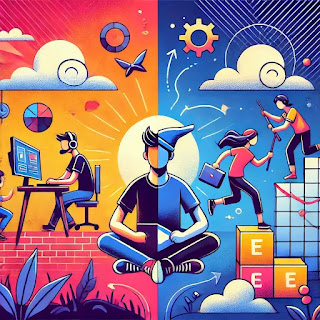Solo vs Team Game Development: Which Path is Right for You?
Game development is an exciting and creative journey, but one crucial decision every developer faces is whether to work solo or as part of a team. Both approaches come with unique challenges and advantages, making it essential to understand which suits your goals and working style. Let’s explore the key differences between solo and team-based game development to help you choose the right path.
The Case for Solo Game Development
Going solo means you take full responsibility for every aspect of the game, from design and coding to art, sound, and marketing. This approach is often favored by indie developers who want complete creative control.
Advantages of Solo Development
- Full Creative Freedom – You make all the decisions without compromise, allowing your vision to come to life exactly as you imagine.
- Flexible Work Schedule – You can set your own deadlines and work at your own pace.
- Lower Costs – There are no salaries to pay or team expenses, making solo development more financially feasible.
- Complete Learning Experience – You gain hands-on experience in all areas of game development, improving your skills across multiple disciplines.
Challenges of Solo Development
- Time-Consuming – Handling all aspects alone can slow down progress and extend development time.
- Skill Limitations – You might not be equally skilled in all areas, leading to weaker aspects in your game.
- Lack of Feedback – Without teammates, it’s harder to receive critical feedback and fresh perspectives.
- Marketing and Business Burden – You must also handle game promotion, funding, and publishing, which can be overwhelming.
The Case for Team Game Development
Working with a team means collaborating with specialists in different areas, such as programming, art, sound, and marketing. This is the standard approach for larger-scale game development.
Advantages of Team Development
- Shared Workload – Tasks are distributed among team members, allowing for faster development.
- Diverse Skill Sets – Each member brings expertise in their respective field, resulting in higher-quality work.
- Collaborative Creativity – Brainstorming with a team can lead to more innovative ideas and problem-solving.
- Better Accountability – With deadlines and responsibilities assigned, productivity tends to be more structured.
Challenges of Team Development
- Creative Differences – Disagreements can arise, requiring compromises that may alter the original vision.
- Higher Costs – Hiring professionals or forming a team requires funding, which may not be available for indie developers.
- Management Overhead – Communication, coordination, and project management become crucial to keep the team aligned.
- Risk of Dependency – If a key team member leaves, it can slow down or even halt development.
Which Path is Right for You?
The decision between solo and team development depends on several factors:
- If you value complete control and can manage multiple disciplines, solo development might be for you.
- If you prefer working with specialists and want to develop games at a faster pace, a team-based approach is ideal.
- If you’re just starting, consider working solo on small projects before joining or forming a team for larger-scale games.
Final Thoughts
Both solo and team development have their merits, and there’s no one-size-fits-all answer. Many developers start solo and later transition into teams as their projects grow. The key is to understand your strengths, weaknesses, and personal preferences when deciding how to approach game development.
Which path do you think suits you best? Let’s discuss in the comments!



Comments